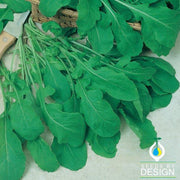Growing Non-GMO Slow Bolt Arugula Roquette Vegetable Seeds
How to Grow Slow-Bolt Arugula Herb from Seed
Sow seeds as early in spring as the soil can be worked, about 1/4 inch deep in rows 12 inches apart. When seedlings are 2 to 3 inches tall, thin plants to 3 to 4 inches apart. For best results, plants should grow quickly and steadily, as leaf flavor gets stronger with warm weather and less irrigation. To assure optimum growth and flavor, sow seeds early in cool weather in loose, well-composted soil. Keep soil moist. Baby leaves can be harvested as early as 25 days, larger leaves will be ready in 45 days.
Whether sowing Slow Bolt arugula seeds or a wild arugula variety, they are popularly sown about every 2 weeks in the summer for a successive and season-long arugula crop. Although a slow bolting seed, arugula will still require some partial shade in the summer heat to be able to produce up until the frost. Slow Bolt arugula seeds are a choice microgreens crop, able to be sown and harvested indoors year-round, a clever and delicious way to use those extra arugula seeds in the middle of winter.
Roquette Arugula in the Vegetable Garden
Slow Bolt arugula seeds are ideal for gardens prone to overly warm summers, yet would still like to try their hand and arugula gardening. Known throughout the world by any number of names including "rocket" and "roquette", garden arugula seeds quickly mature into a tender annual most commonly found in mixed greens and Mesclun mixes featuring mizuna, baby spinach radicchio, and dandelion. Growing Slow Bolt arugula seeds helps to maintain the best possible flavor while in the garden, keeping the plant from bolting to seed which immediately spoils flavor, color, and tenderness.
Closely related to the weedy and tenacious dandelion green, arugula boasts the same weed-like vigor in the garden. Arugula greens are best when harvested at about 2-3" long, often grown as "baby arugula" able to be kept as a "cut and come again" crop, but naturally will want to branch out and bolt to seed as if it were an invasive crop.
Harvesting Roquette Garden Herb
The entire plant may be harvested, or individual leaves may be cut from the plant. Leaves give a sharp, spicy, pungent, peppery taste, similar to horseradish, in mixed salads, complementing both bland butterhead lettuce and bitter chicories. Best used raw in salads and in tomato dishes when the serrated leaves are only two to three inches long. It can be steamed, cooked as a potherb, or pureed and added to soups. Harvested leaves can be frozen for later use, similar to spinach or other greens.
About Slow-Bolt Arugula Roquette Garden Seeds
Slow Bolt arugula seeds. Eruca vesicaria sativa. Heirloom. Open-pollinated. Ancient Romans and Egyptians considered it to be an aphrodisiac. The British cultivated it for centuries, and it was in the earliest gardens in New England. Today, Roquette is popular with Italians, French, Spanish, Greeks, and Egyptians; it is becoming more popular in the United States.
Slow Bolt arugula seeds are ideal for gardens prone to overly warm summers, yet would still like to try their hand and arugula gardening. Known throughout the world by any number of names including "rocket" and "roquette", garden arugula seeds quickly mature into a tender annual.
Most commonly found in mixed greens and Mesclun mixes featuring mizuna, baby spinach radicchio, and dandelion. Growing Slow Bolt arugula seeds helps to maintain the best possible flavor while in the garden, keeping the plant from bolting to seed which immediately spoils flavor, color, and tenderness.
Just like many greens and vegetables to come out of the garden, non-GMO Slow Bolt arugula boasts all the same nutritional benefits that inspire home gardens the world over. Culinary arugula is very similar to leaf lettuce, rich in essential nutrients such calcium, potassium, phosphorus, and magnesium, while comprised of more than 90% water with a mere 25 calories per 100g serving.
While arugula is a healthy and low-calorie option for many diets, it has a limited history of being used for anything else other than culinary purposes. Unlike some herbaceous perennial herbs that have a long and extensive history of medicinal and cultural significance, arugula has earned its stripes throughout the millennia as being a reliably fast leafy vegetable harvest.






